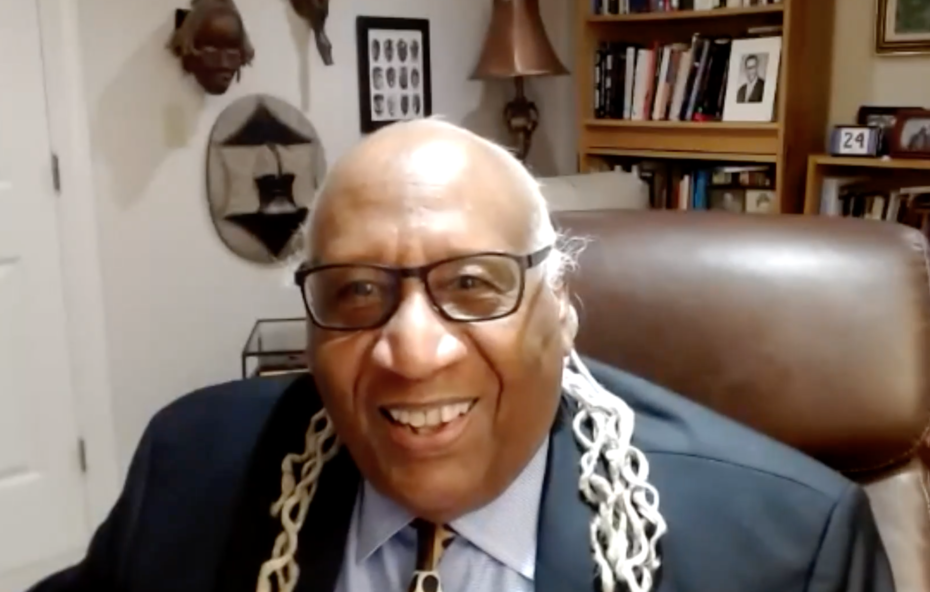
In his keynote address at the Opening Ceremony for Black History Month on February 1, Dr. James Jones spoke eloquently about the foundational significance of slavery in the United States.
“Without the enslavement of Africans, there would be no United States of America. That’s not hyperbole. That’s fact,” said Jones, the Trustees’ Distinguished Professor Emeritus of Psychological and Brain Sciences and Black American Studies and Director of the Center for the Study of Diversity at the University of Delaware. “Slaves helped build colonial America and made the wealth of this nation possible.
“Despite, or perhaps because, of their importance to the development of the United States, African slaves were dehumanized, stripped of all basic freedoms, and treated as commodities with no human rights,” said Jones.
“You think about what life must have been like under those conditions. And you wonder how did they survive? How did they manage to create society, to create psychological health, to protect themselves physically, emotionally and psychologically in the world that was designed to strip them of all of that,” he said. “I think back on that and I reached this conclusion: The survival and evolution of Africans in America is a remarkable story in the history of the world.”
“Black history chronicles the best and the worst of America,” Jones told the virtual audience.
Black success in the shadow of slavery
At several points during his address, Jones set the stories of his own success against the backdrop of slavery. In 1966, he became the first Black graduate student to be admitted to Yale’s Psychology Department. Four years later, he became the first Black faculty member of Harvard’s Psychology Department.
While he called those years among the best of his academic experience, he was always aware that both institutions were built, or endowed, in large part through the slave trade.
“Harvard benefitted from slavery in the same way that Yale did, and Brown did, and Georgetown did, and America did,” he said.
Catalyst for change
Jones told his audience that, as difficult as history can be to revisit, it is essential that we keep it close to better inform the future. “History happened. History matters. We are finding out that history can be a catalyst for change,” he said.
“My academic journey was a Black history journey. I helped open spaces at Yale and Harvard for psychology to grow in relevance and awareness and for other Black students and scholars to enter,” Jones said. “Black history touches my life at every turn and is integral to being a citizen, Black or white, in the United States of America and, I’m sure, in other parts of the world including Canada.”
Jones himself has helped initiate change. As the Executive Director for Public Interest and Director of the Minority Fellowship Program (MFP) at the American Psychological Association, he won 25 million dollars in training grant funds from the National Institute of Mental Health to support the professional development of about 1,500 students of colour who otherwise may not have been able to attend graduate training programs in Psychology and Neuroscience.
Graduates from the MFP have gone on to careers as professors, researchers, mental health practitioners and university administrators, including a number of university presidents.
“I think the value of what we’ve accomplished at the Minority Fellowship Program is the ability to [support] people with talent, capacity, character and commitment to spread throughout the world and find a place where they can be most effective and most valuable,” said Jones. “The MFP is more than the 1,500 people we have supported, it’s all of the impact they’ve had across the land.”
Story of the world
“Diversity is not easy. It’s hard work – as many of you know,” said Jones, addressing his audience. But he was adamant that people must continue to strive for diversity and to shoulder the heavy loads to achieve it.
“Let me be clear, diversity, writ large, is a struggle for the soul of America, Canada and the world,” said Jones.
And Jones is a man who knows something about diversity. His maternal grandfather was a slave born on a plantation in South Carolina; his paternal grandmother was park Black, part Cherokee; his paternal great-grandfather immigrated from Jamaica and his paternal great-grandmother was an immigrant from Switzerland.
“My story is a story of the world,” he said.
Full participation, nothing less
For Jones, the end game of diversity is no less than what he calls “full participation.”
“Full participation is a product of diversity. It isn’t diversity itself,” he said. “It is an affirmative value focused on creating institutions [and societies] that enable people, whatever their identity, background, or institutional position, to thrive, realize their capabilities, engage meaningfully in institutional life, and contribute to the flourishing of others.”
He reminded the audience that, going back to the MFP model, “we’re not only trying to be supportive of individuals. We also want them to contribute to the flourishing of others. In the end, everyone helps everyone be better, live better, and be more fulfilled.”
Compromise needed
One of the challenges with diversity is that it requires compromise.
“Racism has a moral clarity. A racist is bad and non-racist is good. There is a moral clarity as to what is good and what is not,” says Jones. “Diversity presents moral ambiguity. What do we do when we have two goods that may conflict? How do we adjudicate that?
“I think diversity has to figure out ways to adjudicate and navigate the dilemma of competing valid interests,” said Jones. “Diversity presents different expectations, needs, preferences and strategies… You can’t give everybody what they want so you have to make compromises. Diversity demands that.”
